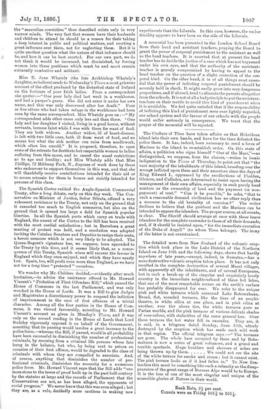The Crofters of Tiree have taken affairs on that Hebridean
island into their own hands, and have for the time defeated the police there. It has, indeed, been necessary to send a force of Marines to the island to re-establish order. On this state of affairs, a politician who signs himself "One of the Mass,"—as distinguished, we suppose, from the classes,—writes in ironic indignation to the Times of Thursday, to point out that "the vast majority of the inhabitants of this island, brooding over the wrongs inflicted upon them and their ancestors since the days of King Edward I., oppressed by the recollections of Flodden, Glencoe, and Culloden, are determined to insist upon having the management of their own affairs, especially in such purely local matters as the ownership of land and the payment (or non- payment) of rent." "Can it be possible," he asks, "that to such a reasonable demand civilisation has no other reply than a recourse to the old brutality of coercion ?" The writer declines to believe that the gunboat and the Marines can be intended to oppose the islanders. The proper course, at all events, is clear. The Sheriff should arrange at once with these brave islanders for the complete surrender to them of all their demands, and, if it should be insisted upon, "for the immediate execution of the Duke of Argyll" (to whom Tiree belongs). The irony of the letter is not overstrained.


































 Previous page
Previous page